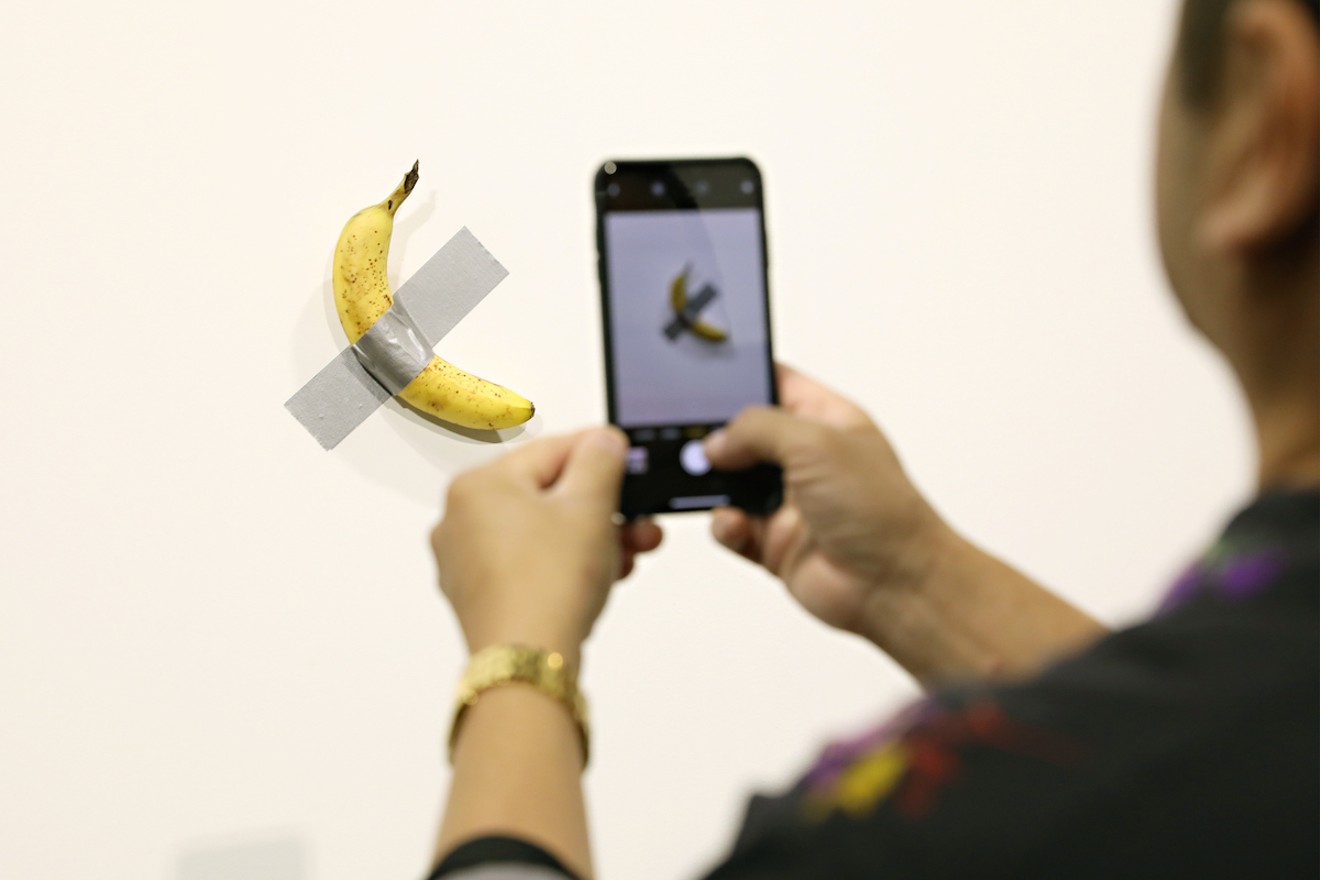The selling price isn't what made the piece noteworthy, because art regularly goes for ten times that amount at Basel. What makes Comedian unique is what it is: a banana duct-taped to a wall. Cattelan literally walked into a supermarket in Miami, bought a banana, and taped it to the wall at Perrotin's booth; then the dealer declared it to be worth $120,000. And people bought it. The buyers were later revealed to be Sarah Andelman, founder of the influential Parisian boutique Colette (now closed); and Billy and Beatrice Cox, an art-collecting couple from Miami.
The piece made international news almost instantly. The New York Post put the banana on the front page, which declared "Art World Gone Mad." Perrotin raised the price on Comedian to $150,000 immediately after the second sale in the hopes a museum would purchase it. Then, during the fair's public hours, a man decided to do what everyone was thinking: He took the banana off the wall and ate it. Later, he was revealed to be Georgian-American artist David Datuna, who declared his act a piece of performance art, which he titled Hungry Artist. Afterward, the gallery taped another banana to the wall — this is conceptual art after all, so what is being sold is not the banana itself but the idea of taping a banana to a wall, along with a certificate of authenticity. (You could tape a banana to your own wall, but it would be a forgery.)
In mere days, Comedian had become a massive meme, an international sensation, and the defining work of the fair, maybe the year, and maybe the decade. Hundreds of spectators lined up to gawk and take selfies with the world's most expensive banana — so many that police had to be called before Perrotin took the work down Sunday morning. In a statement about the removal, the gallery declared it to be a "complex reflection of ourselves."
The first question one might ask about Comedian is whether it's art. That's probably not a useful question, because the definition of "art" in the Western world has changed greatly over the past 200 years. Before the late 19th Century, if someone wanted to be considered an artist, that person would have to create portraits, landscapes, still lifes, giant mythological/historical paintings, and sculptures where everyone is inexplicably naked, and everything had to appear perfect and lifelike. The definition began to change with the impressionists, who painted things as they saw them, not as a perfect representation of reality. In 1875, a Frenchman, Gustave Caillebotte, decided to shake things up by painting The Floor Scrapers, showing some workers redoing a floor in a Paris apartment. Compositionally, it's a great painting. The light shining from a window contrasts well with the shadows cast by the workers and the dark brown of the floorboards. But because Caillebotte dared to depict a working-class subject, the painting was banned by the Salon — the Art Basel of its day — for "vulgar subject matter." Today it hangs in the Musée d'Orsay.This happened and here's the video: someone ripped the Maurizio Cattelan banana off the wall at @ArtBasel and ATE IT ???? pic.twitter.com/JOL41jLoeY
— JiaJia Fei ??? (@VAJIAJIA) December 7, 2019
Later the dadaists came along and declared that, because the governments of Europe had allowed the pointless horrors of World War I to happen, humanity didn't deserve beautiful art. Marcel Duchamp invented the "readymade," in which he took a random object, stuck it on top of another random object, and said it was art. He signed a urinal with the name "R. Mutt" and titled it Fountain. Eight copies exist in museums around the world, including Tate Modern and the Centre Pompidou, and just as Datuna ate the banana, many people have tried to use Fountain as originally intended. Brian Eno succeeded, apparently, in urinating in that priceless, revolutionary artwork.
What we can take away from the banana debacle is that anything can be art. A urinal can be art, and someone pissing into it can be art. Hell, even someone's stated desire to piss in it can be art. Someone can print letters stating an intention to piss in Fountain and say that's art — who's to tell anyone it's not? So the better question to ask about Comedian is not "Is this art?" but rather "Why is this valued as art?" In other words, why have at least two people paid hundreds of thousands of dollars for the right to claim ownership of a banana duct-taped to a wall?
The simple answer is it's funny. It's a banana duct-taped to a wall, and it's in a major art dealer's booth with actual paintings and sculptures that took time and effort to create. No matter where it goes, whatever rarefied museum or collection claims it, that juxtaposition will remain hilarious.
For a more complex answer, we must look at Cattelan's last major artwork, produced in 2016. It's a toilet made of solid 18-karat gold, and unlike Duchamp's Fountain, it is intended for use. The title is America. The piece was installed in the Guggenheim in New York — specifically, in one of the bathrooms — until it was sent to the United Kingdom for a Cattelan retrospective, where it was stolen. Before that, in 2017, when the Trump administration asked to borrow a Vincent van Gogh painting from the Guggenheim to hang in the White House (presidential administrations often make these requests, and it's usually considered an honor), the museum declined and offered America instead.
Comedian is far less literal in meaning. As Perrotin declared, it's a "reflection of ourselves," which means you see whatever you want to see in it. You can look at it and see simply a banana. Or you could look at it and be reminded of the fact that it will rot, making it a memento mori — an artistic reminder of death — and see the duct tape holding it as a comment on the fragility of life. Or you could focus on the fact that food is being taped to a wall, kept from hungry mouths, just as the wealthy patrons at the fair are wasting their money on art instead of paying their taxes so that everyone can have enough to eat. Ah, see? Now we're getting somewhere.
Ultimately, it is useful to see Comedian as a reflection of not only ourselves but also the world and the people who run it, the ones buying art at Basel. Cattelan is pulling a prank on his buyers by telling them that, of all the outstanding objects on sale at Basel, they got the banana taped to the wall because they or someone they knew assured them that it was important or that Cattelan was an important artist whose work is worthy of being collected. He's also showing something to us through this joke: The fact that the wealthy can blow money on a duct-taped banana should signify there is something deeply wrong with the world and there is a material imbalance that ought to be rectified.
The final act of this story should be the ultimate reminder of that fact. After Comedian was removed, a man strode into the Perrotin booth and wrote in lipstick on the blank wall: "EPSTIEN [sic] DIDN'T KILL HIMSELF." He was referring to Jeffrey Epstein — the billionaire pedophile with connections to the Clintons, the British monarchy, former Miami Beach Mayor Philip Levine, and many other global elites who would likely buy art at Basel — who died in jail under mysterious circumstances before his trial for sexual abuse charges was set to begin. Before he was arrested, the man asked, “This is the gallery where anyone can do art, right?”












